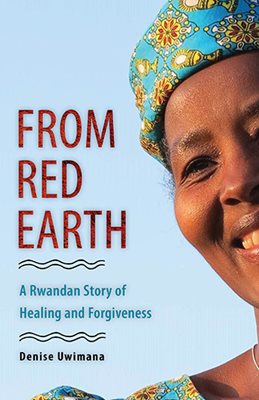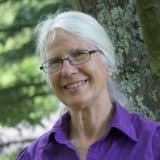
Denise Uwimana found herself in the midst of the Rwandan genocide, during which close to a million Tutsi were hunted and slaughtered by Hutu neighbors. Members of her family were killed. She was caring for her two children alone, and about to give birth to her third child, when a band of men with machetes raided her home. In her book, From Red Earth: A Rwandan Story of Healing and Forgiveness, she tells about her amazing escape from death, with the help of Hutu neighbors who risked their lives to hide her and her children.
Denise doesn’t gloss over the tremendous grief, pain, and hatred she was left with after the genocide. Her trauma caused her to struggle deeply with her faith. With the help of other survivors, however, she was able to return to seek God’s strength, and begin the journey toward forgiveness. What she experienced was so profound, she left her business career to devote her time to empower other genocide widows to band together, tell their stories, face and release their paralyzing emotions, and support each other as they healed and rebuilt their lives. Helping others also helped her heal. In time, many survivors found the strength to forgive and seek reconciliation with those who had attacked them or killed members of their family.
With the help of other survivors, Denise was able to return to seek God’s strength, and begin the journey toward forgiveness.
Members of their groups acknowledged the struggles involved with healing. “Healing from the past is an ongoing journey, with many turns in the road,” acknowledged Goretti, one of the surviving widows and a close friend of Denise. “We forgive, yes, but that doesn’t mean the scars are gone.” She knew that forgiveness can never be forced, but many found healing and freedom as they were able to forgive. And as the survivors wrestled with what to tell the children who were too young to understand what had happened, Denise says, “Yes, their generation must learn our history. But they can learn it in this spirit of working together, as spirit that builds hope and fosters forgiveness.”
The work of Denise and others spread and became a nation-wide movement of truth-telling and reconciliation, instrumental in Rwanda’s recovery and healing as a nation.
I worked with members of the Church of the Brethren of Nigeria (Ekklesiyar Yan’uwa a Nigeria, or EYN) in 2015, as part of the Brethren Disaster Services team. The militant group known as “Boko Haram” had ravished their villages, killing over 10,000 of their members, destroying 1,674 of their church buildings, and internally displacing over 700,000. And I witnessed a similar response: As a church, going through tremendous suffering, they sought to be faithful to Jesus and not retaliate against those who terrorized them, but, with God’s help, find the way to forgiveness. In their trauma healing workshops, those who saw members of families killed, who were attacked themselves, and who lost homes and property, came together to share their grief and anger and draw strength from their faith as they walked through the healing process. Several EYN members have also been actively bringing Christians and Muslims together to work for reconciliation and ease the tensions increased by the attacks.
For those of us who have a hard time accepting lesser hardships or forgiving even slight offenses, we know that what these Rwandan and Nigerian Christians have been doing is hard. Many of us in the U.S. see ourselves and our society as more advanced, or even superior to African countries, and our faith more sophisticated. If we are open, however, we can learn from people in Rwanda like Denise or the Nigerian Brethren who, in their simple faith, take Jesus’ life and teachings seriously and find a way to receive strength beyond their own. Their lives are, for us, a living witness to the power of forgiveness, the healing God’s Spirit can give to open hearts, and the possibilities for reconciliation in current social situations of devastating violence.
 Peggy Faw Gish has worked in Iraq and Palestine with the Christian Peacemaker Teams since 2002, and is the author of Iraq: A Journey of Hope and Peace and Walking through Fire: Iraqis’ Struggle for Justice and Reconciliation. Her article, “Learning to Love Boko Haram,” telling more of the story of the EYN response to Boko Haram, was published in the Autumn 2015 Plough Quarterly.
Peggy Faw Gish has worked in Iraq and Palestine with the Christian Peacemaker Teams since 2002, and is the author of Iraq: A Journey of Hope and Peace and Walking through Fire: Iraqis’ Struggle for Justice and Reconciliation. Her article, “Learning to Love Boko Haram,” telling more of the story of the EYN response to Boko Haram, was published in the Autumn 2015 Plough Quarterly.

